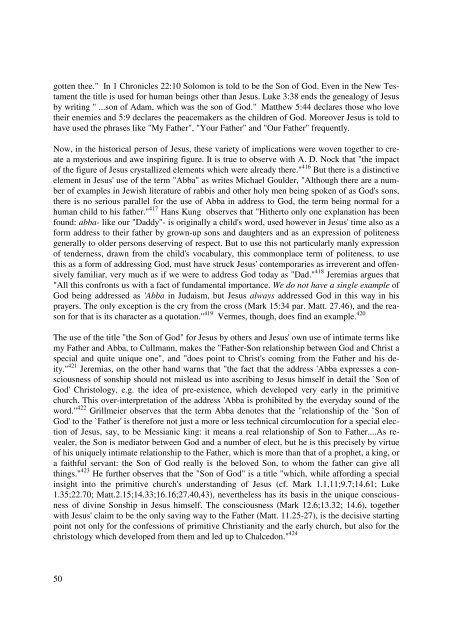Scripture and God in Christianity
Scripture and God in Christianity
Scripture and God in Christianity
You also want an ePaper? Increase the reach of your titles
YUMPU automatically turns print PDFs into web optimized ePapers that Google loves.
gotten thee." In 1 Chronicles 22:10 Solomon is told to be the Son of <strong>God</strong>. Even <strong>in</strong> the New Testament<br />
the title is used for human be<strong>in</strong>gs other than Jesus. Luke 3:38 ends the genealogy of Jesus<br />
by writ<strong>in</strong>g " ...son of Adam, which was the son of <strong>God</strong>." Matthew 5:44 declares those who love<br />
their enemies <strong>and</strong> 5:9 declares the peacemakers as the children of <strong>God</strong>. Moreover Jesus is told to<br />
have used the phrases like "My Father", "Your Father" <strong>and</strong> "Our Father" frequently.<br />
Now, <strong>in</strong> the historical person of Jesus, these variety of implications were woven together to create<br />
a mysterious <strong>and</strong> awe <strong>in</strong>spir<strong>in</strong>g figure. It is true to observe with A. D. Nock that "the impact<br />
of the figure of Jesus crystallized elements which were already there." 416 But there is a dist<strong>in</strong>ctive<br />
element <strong>in</strong> Jesus' use of the term "Abba" as writes Michael Goulder, "Although there are a number<br />
of examples <strong>in</strong> Jewish literature of rabbis <strong>and</strong> other holy men be<strong>in</strong>g spoken of as <strong>God</strong>'s sons,<br />
there is no serious parallel for the use of Abba <strong>in</strong> address to <strong>God</strong>, the term be<strong>in</strong>g normal for a<br />
human child to his father." 417 Hans Kung observes that "Hitherto only one explanation has been<br />
found: abba- like our "Daddy"- is orig<strong>in</strong>ally a child's word, used however <strong>in</strong> Jesus' time also as a<br />
form address to their father by grown-up sons <strong>and</strong> daughters <strong>and</strong> as an expression of politeness<br />
generally to older persons deserv<strong>in</strong>g of respect. But to use this not particularly manly expression<br />
of tenderness, drawn from the child's vocabulary, this commonplace term of politeness, to use<br />
this as a form of address<strong>in</strong>g <strong>God</strong>, must have struck Jesus' contemporaries as irreverent <strong>and</strong> offensively<br />
familiar, very much as if we were to address <strong>God</strong> today as "Dad." 418 Jeremias argues that<br />
"All this confronts us with a fact of fundamental importance. We do not have a s<strong>in</strong>gle example of<br />
<strong>God</strong> be<strong>in</strong>g addressed as 'Abba <strong>in</strong> Judaism, but Jesus always addressed <strong>God</strong> <strong>in</strong> this way <strong>in</strong> his<br />
prayers. The only exception is the cry from the cross (Mark 15:34 par. Matt. 27.46), <strong>and</strong> the reason<br />
for that is its character as a quotation." 419 Vermes, though, does f<strong>in</strong>d an example. 420<br />
The use of the title "the Son of <strong>God</strong>" for Jesus by others <strong>and</strong> Jesus' own use of <strong>in</strong>timate terms like<br />
my Father <strong>and</strong> Abba, to Cullmann, makes the "Father-Son relationship between <strong>God</strong> <strong>and</strong> Christ a<br />
special <strong>and</strong> quite unique one", <strong>and</strong> "does po<strong>in</strong>t to Christ's com<strong>in</strong>g from the Father <strong>and</strong> his deity."<br />
421 Jeremias, on the other h<strong>and</strong> warns that "the fact that the address 'Abba expresses a consciousness<br />
of sonship should not mislead us <strong>in</strong>to ascrib<strong>in</strong>g to Jesus himself <strong>in</strong> detail the `Son of<br />
<strong>God</strong>' Christology, e.g. the idea of pre-existence, which developed very early <strong>in</strong> the primitive<br />
church. This over-<strong>in</strong>terpretation of the address 'Abba is prohibited by the everyday sound of the<br />
word." 422 Grillmeier observes that the term Abba denotes that the "relationship of the `Son of<br />
<strong>God</strong>' to the `Father' is therefore not just a more or less technical circumlocution for a special election<br />
of Jesus, say, to be Messianic k<strong>in</strong>g: it means a real relationship of Son to Father....As revealer,<br />
the Son is mediator between <strong>God</strong> <strong>and</strong> a number of elect, but he is this precisely by virtue<br />
of his uniquely <strong>in</strong>timate relationship to the Father, which is more than that of a prophet, a k<strong>in</strong>g, or<br />
a faithful servant: the Son of <strong>God</strong> really is the beloved Son, to whom the father can give all<br />
th<strong>in</strong>gs." 423 He further observes that the "Son of <strong>God</strong>" is a title "which, while afford<strong>in</strong>g a special<br />
<strong>in</strong>sight <strong>in</strong>to the primitive church's underst<strong>and</strong><strong>in</strong>g of Jesus (cf. Mark 1.1,11;9.7;14.61; Luke<br />
1.35;22.70; Matt.2.15;14.33;16.16;27.40,43), nevertheless has its basis <strong>in</strong> the unique consciousness<br />
of div<strong>in</strong>e Sonship <strong>in</strong> Jesus himself. The consciousness (Mark 12.6;13.32; 14.6), together<br />
with Jesus' claim to be the only sav<strong>in</strong>g way to the Father (Matt. 11.25-27), is the decisive start<strong>in</strong>g<br />
po<strong>in</strong>t not only for the confessions of primitive <strong>Christianity</strong> <strong>and</strong> the early church, but also for the<br />
christology which developed from them <strong>and</strong> led up to Chalcedon." 424<br />
50
















